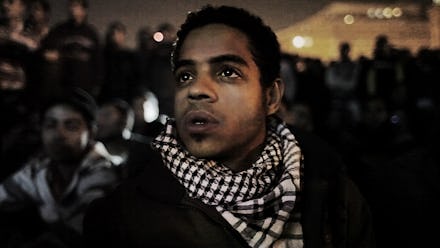'The Square' Is the Bravest Film of the Year — And America Is About to See Why

This year's Best Documentary Oscar category is packed with remarkable films, but one stands above the rest. Whether or not it wins, The Square is the film that should be taking home a statue come March 2.
Filmmaker Jehane Noujaim, a Harvard grad from Egypt, landed in Cairo with her crew as soon as protesters started gathering in Tahrir Square to overthrow Hosni Mubarak in 2011.
Filmed as cinéma vérité, the camera is a living, breathing character in The Square. At times the audience feels the rush — and fear — of running from government-induced violence in crowded streets full of screaming people, guns and nerve gas. At other moments we experience the joy, love and kinship of people believing in something with every ounce of their beings, putting their bodies on the line to make sure those ideals become realities.
'The Square' is remarkable in that it lets its activist protagonists speak for themselves: This is a film about Egyptians, by Egyptians and meant for the whole world to see.
But more than anything, The Square is character-driven. The footage is so intimate at times that viewers are included in bedroom discussions between spouses. "I choose characters I fall in love with. They challenge my perceptions, surprise me and make me laugh. They make me want to film them every day," Noujaim said in a phone interview.
The Square is remarkable in that it lets its activist protagonists speak for themselves: This is a film about Egyptians, by Egyptians and meant for the whole world to see.
We're introduced to fascinating people like Ahmed Hassan, a young activist born in Shobra (a Cairo slum) who has "had every job you can think of." Hassan debates until he's hoarse, puts on a head scarf to hide wounds from police beatings so he doesn't worry his mother and sold lemons on the street from age 8 to make ends meet. "I fell in love with Ahmed immediately," Noujaim said. "He's a street poet and so charismatic."
Then there's Khalid Abdalla, an actor (The Kite Runner) raised in England by his revolutionary father and grandfather in exile, who "could've been anywhere in the world acting but he chose to be in The Square." And there's Ragia Omran, who Noujaim describes as the "Erin Brokovich of Egypt"; folk singer Ramy Essam; and Aida Elkashef, a filmmaker. These men and women elevate the film from a newsbrief to a firsthand chronicle of a few Egyptians' experiences during a highly-publicized period of change.
Magdy Ashour, a member of the Muslim Brotherhood tortured and detained under Mubarak, is particularly captivating as he struggles to understand his place in the movement. "He had an openness and excitement to talk to people who are so very different from him," said Noujaim. And in response to a Washington Post article that tore apart the film's depiction of the Muslim Brotherhood as biased and polarizing, Noujaim said, "Those that believe the film leans one way or the other are missing the point. It's about a few people in the Square. It doesn't pretend to be an overview of the revolution or claim to give the viewpoints of 80 million Egyptians. ... It's an artistic piece that hopefully gives people a sense of an ordinary person. Ahmed was conflicted. Magdy was conflicted. They went through this roller coaster ride of change."
What The Square does most effectively — and why it's so important — is create a space for conversation in a country where it is even tough to screen the film.
But Noujaim isn't concerned. "Once it was nominated for an Oscar, Egyptians decided: 'Why should the rest of the world be able to see the film and we can't see it?' So they've pirated and copied it." Noujaim continued, "The film received 1.5 million views in two weeks because of downloads on bitTorrents and screenings in coffee shops downtown. There were Facebook pages with thousands signing up for these screenings!"
Because of the film's international notoriety, Nojaim feels it "could be a major step for making a case for freedom of speech and democracy in Egypt even when authorities don't agree with what's being said."
The Square signed its distribution deal with Netflix, making it the first-ever Oscar nomination for the provider. They aimed to reach the widest, and most diverse audience possible, according to Noujaim, who noted that many revolutionary friends can't afford cable. Netflix released to 47 different countries at once. And for Noujaim, who conceives of the events at Tahrir as a "global movement even though the particulars in every country are different," it was a perfect fit.
Commenters from the Middle East to South America use #thesquare on social platforms to engage with the film. Noujam said, "Rioters in Kiev asked whether they could show the film. They've dubbed it [in Ukrainian]. It also played at a big plaza in Mexico. The line from the film, 'Were not looking for a leader; we're looking for a conscience' has now been translated into Chinese, Ukrainian, Spanish and Portuguese. We're so thrilled."
Above all, The Square speaks to art as activism and activism as art. After watching the film, a young woman in high school told Noujaim, "This is about finding your square." And to Noujaim, if audiences are inspired to keep fighting for their beliefs despite highs-and-lows along the way, she's succeeded.
Noujaim sits among activists and artists who examine the human condition and create spaces for discourse, satellite Squares, all over the globe. Thanks to them, this time the revolution is televised.